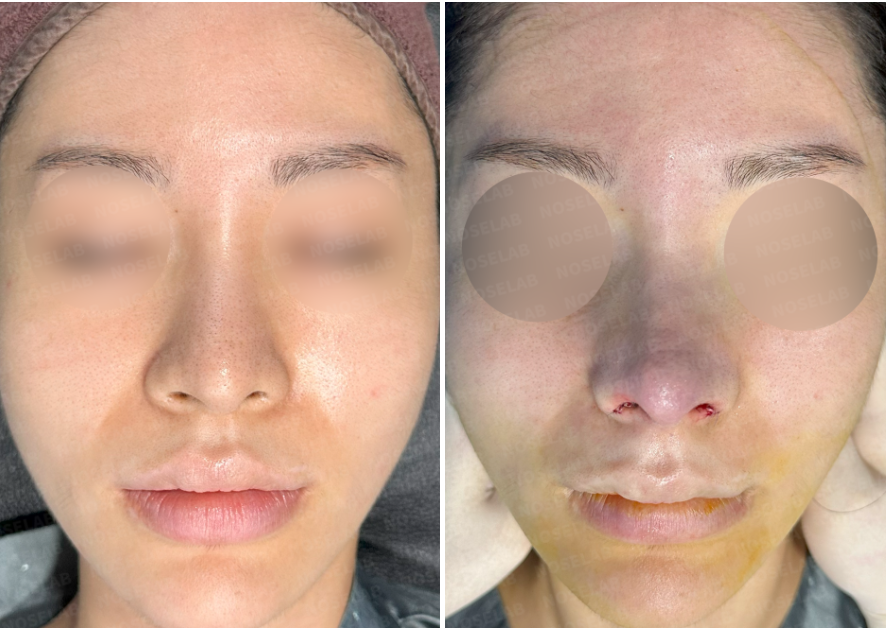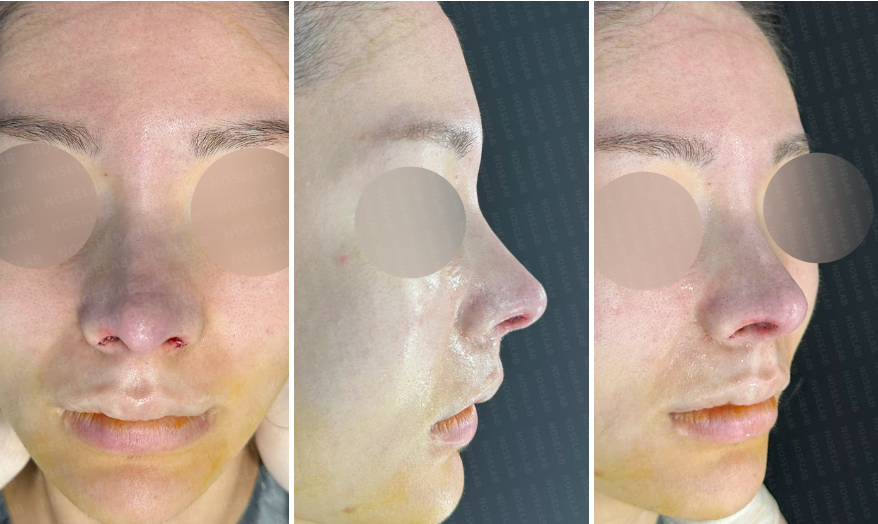Drooping Nose Correction and Bulbous Tip Refinement – Revision Rhinoplasty Korea
- noselab
- 2024년 10월 16일
- 3분 분량
최종 수정일: 2025년 9월 29일
Hello, this is Dr. Cha-Young Kang, Director of Nose Lab Clinic.
Today, I’d like to share a rhinoplasty case involving a patient with multiple concerns, including a long nose, a drooping nasal tip, a wide bridge, and a bulbous tip. This case highlights how comprehensive drooping nose correction can achieve an elegant and natural result.
Pre-Surgery Design Consultation for Drooping Nose Correction
The patient previously underwent rhinoplasty using silicone, ear cartilage, and Medpor, but desired a more refined and natural look.

Frontal View:
High nasal starting point
Broad, bulbous nose with a rounded appearance
Long nasal length
Side View:
Drooping nasal tip
High starting point at the glabella
Nasolabial angle < 90°, exaggerating the droopy tip
Protruding upper lip, convex profile
Oblique View:
Long overall nose
Sharp tip from this angle
Nasal Base:
Nostril asymmetry
Columella tilted to the left

Patient’s Requests:
Narrow alar base
Elevate drooping nasal tip
Refined yet natural appearance
Surgical Procedure – Closed Rhinoplasty with Rib Cartilage
All steps were performed through a closed (endonasal) approach without external scars.
Medpor Removal:Medpor previously placed in the tip was carefully removed to prevent further complications.
Septal Extension with Autologous Rib Cartilage:Rib cartilage was harvested and used for septal extension, correcting the droopy tip and columella tilt while improving nostril asymmetry.
Nasal Tip Reshaping:Ear cartilage and soft tissue from the prior surgery were reused to reconstruct the tip into a rounder, natural shape.
Nasal Base Reduction:The wide alar base was narrowed, balancing the nasal shape.
Alar Cartilage Repositioning and Tying:The bulbous tip was refined for a more defined, natural contour.
Nasolabial Angle Adjustment:The droopy tip and protruding lip appearance were corrected by adjusting the angle to about 95°.

Medpor Removal from the Nasal Tip
Before and After Results of Drooping Nose Correction

Frontal View:
Wide and bulbous nose refined into a balanced contour
Drooping tip elevated and reshaped
Starting point lowered for a softer transition

Oblique View:
Droopy tip lifted naturally
Previously sharp tip softened into a rounder shape

Profile View:
Long nose proportion shortened
Nasolabial angle corrected to ~95°
Protruding upper lip improved for facial balance

Nostril View:
Asymmetry corrected
Tilted columella straightened for better symmetry
Final Evaluation
This case shows how complex issues—including a drooping tip, bulbous shape, long nose, and wide base—can be addressed simultaneously through drooping nose correction with
rib cartilage. Key highlights include:
Safe Medpor removal without damaging septal cartilage
Rib cartilage septal extension providing long-term stability
Efficient reuse of ear cartilage from prior surgery
Functional and cosmetic harmony achieved through nasolabial angle correction


Closing Remarks
For patients struggling with complex nasal concerns such as a drooping tip, long nose, or wide nasal base, this case offers reassurance. Removing foreign materials like Medpor or mesh is often necessary for safe, lasting results, but must be performed by an experienced surgeon due to adhesion risks.
At Nose Lab Clinic, we specialize in closed rhinoplasty using autologous cartilage to create natural, elegant, and functional results tailored to each patient.
This has been Dr. Cha-Young Kang, Director of Nose Lab Clinic.
Thank you.

Messenger(WhatsApp) : +82 1057360302
Home page : www.noselab.co.kr
Instagram : noselab_global
YouTube : Noselab
Email : noselab@naver.com



댓글